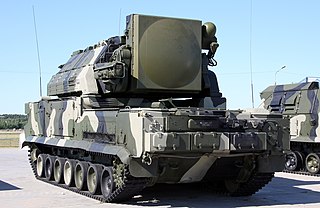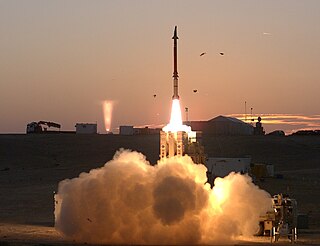
The Tor is an all-weather, low-to medium-altitude, short-range surface-to-air missile system designed for destroying airplanes, helicopters, cruise missiles, unmanned aerial vehicles and short-range ballistic threats (anti-munitions). Originally developed by the Soviet Union under the GRAU designation 9K330 Tor, the system is commonly known by its NATO reporting name, SA-15 "Gauntlet". A navalized variant was developed under the name 3K95 "Kinzhal", also known as the SA-N-9 "Gauntlet". Tor was designed to shoot down guided weapons like the AGM-86 ALCM and BGM-34 day and night, in bad weather and jamming situations. Tor can detect targets while on the move. The vehicle must stop intermittently when firing, although trials have been conducted with the goal of eliminating this restriction.

The S-400 Triumf, previously known as the S-300 PMU-3, is a mobile surface-to-air missile (SAM) system developed in the 1990s by Russia's NPO Almaz as an upgrade to the S-300 family of missiles. The S-400 was approved for service on 28 April 2007 and the first battalion of the systems assumed combat duty on 6 August 2007. The system is complemented by its successor, the S-500.

The Israeli Air Defense Command is the Israeli Air and Space Force unit responsible for the surface front of Israels air defense, complementing the air defense provided by Fighter squadrons. Initially a part of the IDF Artillery Corps, since 1970 the Air Defense Command has been subordinate to the Israeli Air and Space Force.

The Islamic Republic of Iran Air Defense Force is the anti-aircraft warfare service branch of Iran's regular military, the Islamic Republic of Iran Army (Artesh). It split from the air force (IRIAF) in 2008 and controls the country's military radar network.

The Pantsir missile system is a family of self-propelled, medium-range surface-to-air missile and anti-aircraft artillery systems. Three types of vehicles make up one system: a missile launcher, a radar truck and a command post. Starting with the Pantsir-S1 as the first version, it is produced by KBP Instrument Design Bureau of Tula, Russia, and is the successor to the Tunguska M1.

The SPYDER is an Israeli short and medium range mobile air defence system developed by Rafael Advanced Defense Systems with assistance from Israel Aerospace Industries (IAI). Rafael is the prime contractor and IAI is the major subcontractor for the SPYDER program. This system achieved a notable milestone in 2005 when missiles were fired against test targets in Shdema, Israel and scored direct hits. Since then, it has been showcased in multiple military exhibitions throughout the world.

Mersad is an Iranian low- to mid-range air defense system developed in 2010. It fires Shahin (Falcon) missiles which are reverse-engineered, domestically upgraded versions of the American MIM-23 Hawk surface-to-air missiles. It uses a series of domestically produced radars and electronic devices.

The RIM-66 Standard MR (SM-1MR/SM-2MR) is a medium-range surface-to-air missile (SAM), with a secondary role as an anti-ship missile, developed for the United States Navy (USN). A member of the Standard Missile family of weapons, the SM-1 was developed as a replacement for the RIM-2 Terrier and RIM-24 Tartar that were deployed in the 1950s on a variety of USN ships. The RIM-67 Standard (SM-1ER/SM-2ER) is an extended range version of this missile with a solid rocket booster stage.

Iron Dome is an Israeli mobile all-weather air defense system, developed by Rafael Advanced Defense Systems and Israel Aerospace Industries. The system is designed to intercept and destroy short-range rockets and artillery shells fired from distances of 4 to 70 kilometres (2–43 mi) away and whose trajectory would take them to an Israeli populated area. From 2011 to 2021, the United States contributed a total of US$1.6 billion to the Iron Dome defense system, with another US$1 billion approved by the US Congress in 2022.

David's Sling, also formerly known as Magic Wand, is an Israel Defense Forces military system jointly developed by the Israeli defense contractor Rafael Advanced Defense Systems and the American defense contractor Raytheon, that became operational in 2017. It is designed to intercept enemy planes, drones, tactical ballistic missiles, medium to long-range rockets and cruise missiles, fired at ranges from 40 to 300 km. David's Sling is intended to replace the MIM-23 Hawk and MIM-104 Patriot in the Israeli arsenal.

The HESA Karrar is an Iranian jet-powered target drone manufactured by Iran Aircraft Manufacturing Industrial Company (HESA) since 2010. The Karrar is a derivative of the American 1970s-era Beechcraft MQM-107 Streaker target drone, probably incorporating elements from the South African Skua, with hardpoints added for munitions. The Karrar was developed during the Ahmadinejad presidency.

Mesbah 1 is an Iranian anti aircraft artillery system developed to defend against incoming cruise missiles. It was unveiled in 2010 by Iranian defense minister Ahmad Vahidi and hit its intended target successfully in the test. Production started some months later.

Barak 8, also known as LR-SAM or MR-SAM and Barak MX, is an Indian-Israeli jointly developed surface-to-air missile (SAM) system, designed to defend against any type of airborne threat including aircraft, helicopters, anti-ship missiles, and UAVs as well as ballistic missiles, cruise missiles and combat jets. Both maritime and land-based variants of the system exist.

Raad or Ra'd is an Iranian modern aerial defence system deployed in September 2012.The system is designed to enhance Iran's capabilities in terms of defense, and as a partner to Bavar 373 air defense system. According to Fars news agency, the Raad is designed to confront fighter jets, cruise missiles, smart bombs, helicopters and drones. The system is also designed specially for US fighters. The system is equipped with "Taer" (Bird) missiles, which can trace and hit targets in ranges up to 105 km and at altitudes from 25 to 27 km, Ra'd is a mid-range radar system and air defense system.

Iron Beam, officially מגן אור, Shield of Light is a directed-energy weapon air defense system unveiled at the Singapore Airshow on February 11, 2014 by Israeli defense contractor Rafael Advanced Defense Systems.

Sayyad is a series of solid fuel surface-to-air missiles (SAM) manufactured by Iran.
A loitering munition, also known as a suicide drone, kamikaze drone, or exploding drone, is a kind of aerial weapon with a built-in warhead that is typically designed to loiter around a target area until a target is located, then attack the target by crashing into it. Loitering munitions enable faster reaction times against hidden targets that emerge for short periods without placing high-value platforms near the target area and also allow more selective targeting as the attack can be changed mid-flight or aborted.

The Sadid-1 is an Iranian TV-guided anti-tank missile derived from Iran's Toophan missiles.

The Mohajer-6 is an Iranian single-engine multirole ISTAR UAV capable of carrying a multispectral surveillance payload and/or up to four precision-guided munitions.

















